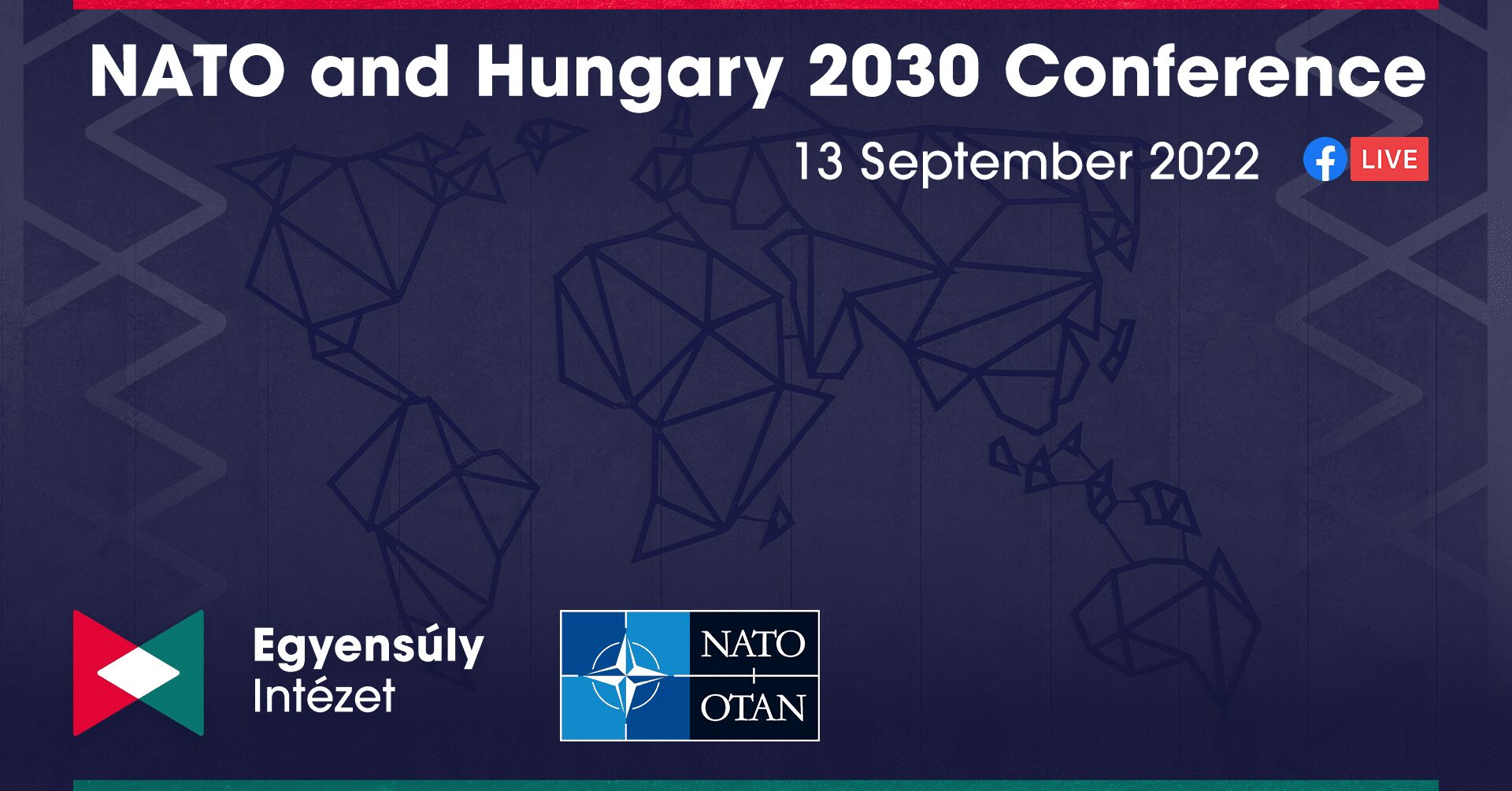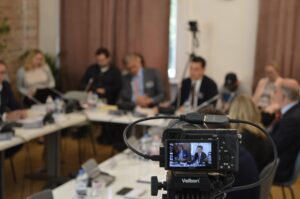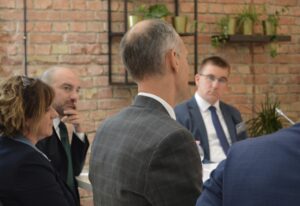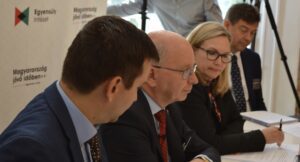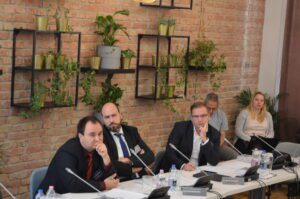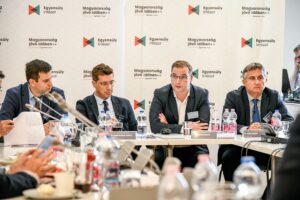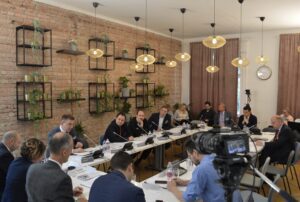SUMMARY AND RECOMMENDATIONS
NATO AND HUNGARY 2030 CONFERENCE
13 September 2022, Budapest
On the 13th of September 2022, the Equilibrium Institute of Budapest (Egyensúly Intézet) had the pleasure of hosting the “NATO and Hungary 2030“ conference jointly with NATO.
As the new Strategic Concept of NATO highlights, the Russian aggression in Ukraine shattered the peace and altered the security environment in Europe, most visibly in Central Europe. Although reactions to the war were highly different based on the differing threat perceptions, member states of NATO remained united in condemning the aggression and calling for investment in their security. The war very well illustrated what are the key capabilities that should be improved to effectively counter and deter Russia.
The conference was opened by Tamás Boros, executive Director of the Equilibrium Institute, who welcomed the guests by pointing out that the main goal of the event was to stimulate discussion in Central Europe and Hungary about defence policy and the changing global security environment, to endorse talks about the historical Madrid summit, the new Strategic Concept and the accession process of Finland and Sweden, and to intensify the dialogue on Hungary’s role in NATO and the implications the current crises have on Central European states’ defence strategies.
Petr Lunak, Deputy Head of the Engagement Section at NATO’s Public Diplomacy Division welcomed the decision-makers and experts as well, by laying out the main results of the Madrid summit held in June 2022, and stressed that it was without question a historical moment in the history of the liberal world order. Mr Lunak raised attention to the most important pillars of the summit and the implications they had for the Transatlantic alliance: The raging war in Ukraine, collective security and deterrence, Russia’s approval as a global security threat, Sweden and Finland’s ongoing accession process, and China being openly a challenge to NATO’s interest, security and values.
PANEL 1 – The changing global security environment and its implications for Central Europe
In the first-panel discussion Max Bergmann, the Director of the Europe Program at the Center for Strategic & International Studies opened the floor by stating that
Putin has done a total debacle, just like the Americans did during the war in the Middle East that has lasted for 8 years, without real results.
According to Max Bergmann
Russia is now in a situation in which it can only maintain its position through mass mobilization,
which would be politically risky in the domestic context, and would threaten the survival of Putin’s regime, therefore it is not predictable how the Russian administration will handle the current decline in the Russian offensive. About the economic factors, and whether sanctions are effective or not, – Mr Bergmann stated – that it has always been clear, that
“banks do not stop tanks”.
However, banks can prevent governments from funding the production of additional tanks, therefore Russia will definitely feel the impact of sanctions, as Moscow soon has to start replacing destroyed tanks and weapons, and when doing so, the Russians will feel the lack of advanced Western technologies and Western components in the military-industrial sector. They might develop their own capabilities – and while import substitution sounds good in theory- in practice Russians will not be able to catch up to the modern technologies as fast as they would need to, especially since China is not keen on helping Russia either. Regarding the question of energy security in Europe which is dependent on Russian gas, it is obvious that Russia is causing painful price spikes in Europe, but
Europe is showing the resilience of democratic societies and is adapting to all current global crises.
Russia, on the other hand, does not have other options where to sell its gas, as it is coming on pipelines, and would take decades to ship LNG to China for example.
Dr Réka Szemerkényi, Senior Advisor in Transatlantic Strategy at the International Republican Institute and former Ambassador of Hungary to the United States started her remarks by laying out the five most current and important strategic developments Europe and the US are facing.
First of all,
Russia’s place in the world has to be reassessed taking into consideration the gap between Russia’s military capabilities and political aspirations.
Secondly, Russia has now lost its strategic position in the world, while
in Ukraine a new national identity has been born.
The issue of national identity was one of the weakest points of Ukraine and now the nation is more integrated than ever, even the Russian-speaking inhabitants claim themself to be Ukrainian – argued Ms Szemerkényi. Thirdly,
the power balance has shifted in Europe, as Central Eastern Europe is now in a situation where its position is more important than ever,
now the CEE countries are the ones stepping up and launching strategic initiatives, which is the beginning of a different trend, in which Europe’s strategically leading states will not be in the West, but rather in the Central and Eastern regions. The fourth point addressed by Ms Szemerkényi is that
Europe has gained a new de facto member, as a partnership with Ukraine will from now on be very important for EU member states.
Also, Europe has now proved its strategic role on the world stage by launching plans and making decisions which put the EU back on the table of great power politics. Ms Szemerkényi’s last point concerned Transatlantic relations and the fact that NATO is more important than ever before, and that the
EU-US partnership has proved to be an effective alliance, with real action and real partnership.
Ms Szemerkényi finished her remarks by stating that the post cold war era is now over, and looking back we will call the period between 1991 and 2022 the “GEBSC” – Golden Era in Between Strategic Confrontation.
In his speech Márton Ugrósdy, the Deputy State Secretary of the Prime Minister’s Office agreed that the most important thing that is currently being reassessed is the danger Russia is posing to Europe. However, the deputy state secretary made it clear that
he does not see Russia running over Europe,or invading any NATO member state.
From a Hungarian point of view, Mr Ugrósdy raised attention to the physical distance between Russia and Hungary by pointing out that those states that have a common border with Russia have a very different threat perception than those countries like Hungary, which are separated from Russia by another state. Mr Ugrósdy has also pointed out the military modernization taking place in Hungary, which allows us to meet the commitments made at the Wales Summit in 2014 and also to make us able to deploy our capabilities to other countries for example in the Baltics. Overall,
a prosperous and stable Ukraine is in the favour of Hungary as it is our neighbour and its domestic affairs have an effect not only on Hungary but also on the whole of Central Europe.
Hungary is consistent in its support for NATO and the accession of Finland and Sweden, and accessing more countries from the Western Balkans would be in favour of Hungary as well. Regarding sanctions politics, he proposed the idea of reassessing which sanctions work and which do not. Mr Ugródy added that due to the economic crisis,
the social crisis is growing as well, which might lead to a dramatic change in the political landscape in Europe.
András Rácz, Senior Research Fellow at German Council on Foreign Relations (DGAP) emphasised that there is definitely no way back to the status quo in the future and that the disintegration of the post soviet regions going to speed up, as
Russia will no longer be able to use soft power
in the region. Moreover, the sanctions on Russia have not kicked in yet and the country is still awaiting a huge economic blow. Another important thought he added, is that Russia will always remain a major systemic threat, as even in case the Putin administration fails, the illiberal ideology will continuously pose a threat to western democracies, if not by the current Russian government, then by the next one.
Dr András György Deák, a senior research fellow at the Institute for Strategic and Defense Studies, University of Public Service commented on the economic aspect of the war and the sanctions it has brought. He stressed that the sanctions will be disastrous for Russia and regarding the European implications it must be noted that
while financial crises happen often and recovery takes 1-2 years, in the case of energy crises we need structural adaptation which might take half a decade even.
According to Deák, it is a realistic possibility that the Russians will completely stop gas deliveries to Europe, as instead of the 400 million cubic metres per day they used to deliver, they now only send 80 million cubic metres per day through the pipelines. He said it would be extremely disastrous if gas deliveries were to stop, as there would be an immediate global gas shortage and there would be no gas in Central and Eastern Europe for the next two winters.
PANEL 2 – new members to nato: the accession of Finland and Sweden
The panel was started by Minna Laajava, the Director of the Unit for Security Policy and Crisis Management at the Ministry for Foreign Affairs of Finland. She pointed out that the security environment has been changing dramatically in Europe since 2014, with the illegal annexation of Crimea, making unpredictability a permanent challenge in European security. By being a state in Northern Europe and sharing a border and a sea with Russia,
Finland lives in this new reality of uncertainty, in which the Transatlantic alliance and NATO are more important than ever.
Finland has been a NATO partner since 1994 and has contributed to several missions in the Balkans or in Afghanistan. Since 2014, the 28 + 2 cooperation has made partnerships even more closely tied. In mid-May, Finland applied for NATO membership, after a democratic decision made in parliament, which now brings a new era to the security of Finland. Ms Laajava believes Finland will contribute to making NATO more politically and militarily stronger. She added that
Finland is a very technological and digitally advanced country, which is going to be useful for NATO, especially considering the growing number of cybersecurity issues and cyber threats.
In the case of military contribution, Finland has one of the strongest militaries in Europe which will make the country a key element in Europe’s security and defence. Concerning the future, Finland is looking forward to the accession, as NATO will be a key element of its foreign policy strategy.
Ambassador Dag Hartelius, Ambassador of Sweden to Hungary introduced the Swedish point of view by raising attention to the domestic relevance of NATO accession. The Swedish Ambassador has made it clear that he represents a similar view to her Finnish colleague’s, as he believes
the partnership between NATO and Sweden will be mutually beneficial for Sweden and NATO as well,
especially because of the submarines, air force and significant intelligence capabilities of the country, which will greatly contribute to NATO’s success. The Ambassador has reminded everyone that
Sweden has a strong security record, and even during the Cold War the defence part of their budget was around 3-4 per cent,
which means they have experience and security and defence policy. Sweden is still working hard on the accession process, they are having their security strategy reassessed, and are working closely with parliament, Finland and NATO representatives so the process can run smoothly in this insecure and changing security environment.
Marcin Zaborowski, the Policy Director at the Future of Security Program at GLOBSEC stated that a lot has changed since the former strategic concept was approved in 2010, as that one was adopted before the annexation of Crimea and before the full-scale war in 2022. China did not pose such a threat back then as it is posing now. Therefore,
the new strategic concept ratified in 2022 is timely and is an important step toward conforming to the new world order.
Russia is not a strategic partner anymore, but a threat that must be deterred, and the accession of
Sweden and Finland are strategically very important steps as the Baltic sea is now becoming an internal NATO sea,
which is definitely making a huge difference. Moreover, the two new members, Finland and Sweden together with Poland and the Baltic States, will represent a significant military force. Mr Zaborowski mentioned that what he misses from the strategic concept is a vision of the future of Ukraine, and the issue of climate change that are not addressed in-depth.
Professor István Gyarmati, the President of the International Center for Development and Democratic stated that
Putin is not Brezhnev, and neither is Russia the Soviet Union
since Brezhnev was more predictable than the current president. According to Gyarmati, the start of hostilities marks a turning point in both European and global history, but the biggest threat is not China or Russia, but rather the fact that
extremism is rising in Europe,
and the Western press and public are starting to get sick of the war and that more and more people are arguing — aided by Russian propaganda — that it is time to pay attention to domestic issues rather than to the war raging in Ukraine. NATO is not in decline anymore, as it becoming as important as it was during the cold war, simply because we are in a cold war today, the only difference is that there is even a “hot war” in Europe. About the economy, Mr Gyarmati is sure that the sanctions imposed hurt Russia much more than they hurt Europe, only because the EU is much more resilient than Moscow is.
Dr Tamás Csiki Varga, Senior Research Fellow, Institute for Strategic and Defense Studies University of Public Service agreed that there is no return to the status quo ante, and there will be more and more limited manoeuvre between Russia and the rest of Europe. Prior to the war, NATO was using deterrence to prevent any wars from happening, but now, that the war has happened
now only deterrence by denial can work
– he said referring to the war.
Dr Tamás Baranyi, the Deputy Director of the Institute for Foreign Affairs and Trade emphasised that this
new security situation will not allow neutral countries to exist,
sides will have to be chosen. Mr Baranyi also expressed that the
strategic concept is not only extremely timely but long overdue
and should have been ratified years before. However, the strategic document is purely political, it does not have a military stipulation, meaning that there are still internal questions in NATO that have to be discussed concerning the implementation of the policies.
PANEL 3 – the new strategic concept: a Hungarian point of view
Dr Tamás Harangozó, Vice President of the Defense Committee of the Hungarian Parliament and member of Parliament stressed that the National Military Strategy of Hungary clearly sets out that our security is granted by NATO. However,
building national resilience is the responsibility of member states.
Homeland security is an all-nation matter and the civilian control of armed forces is a key element in modern democracies, therefore, every member of parliament and citizen has a right to be informed on key national security issues, which are requirements set in NATO guidelines. Tamás Harangozó also noted that recently there has been a modification in legislation regarding defence and security decisions in case of a state of war, as from November only the Prime Minister will have a say in these questions, without the authorisation of Parliament.
Source: Harangozó Tamás Facebook page
Dr László György Lukács, Vice President of the Defense Committee of the Hungarian Parliament and member of Parliament stated that his party, Jobbik has a lot of points on which they agree with the government’s policies, including the need for a strong army to ensure peace. He stressed that
Hungary needs to have a strong defence strategy, putting aside party politics.
The lesson learned from the conflict in Ukraine is that
we should not underestimate US intelligence,
no matter some intelligence failures in the past. Moreover, in the upcoming years, Hungary has to be more clear on where it stands in case of a war, the country’s motives have to be clear and without question.
Professor Zoltán Szenes, President of the Hungarian Association of Military Sciences contributed to the discussion by elaborating on how we can achieve an increase in our military readiness. He also mentioned that
the German army is currently missing around 15% of the Bundeswehr, and while in Hungary this information is confidential, he believes that Hungary might deal with a similar situation regarding the Hungarian nation army.
Attila Demkó, head of the Geopolitical Institute of the Mathias Corvinus Collegium pointed out that the government is not pursuing a pro-Russian policy, as the Orbán government is doing mostly the same as other European countries are doing.
Hungary has not opposed any NATO decision, Hungarian force development is in line with NATO goals, and there is no cooperation with China or Russia, only with EU and NATO members.
Mr Demkó raised attention to the reason why there might be tension between Hungary and Ukraine: There is a lack of trust between the two governments, mostly because of the issue of the Hungarian minority in Transcarpathia.

